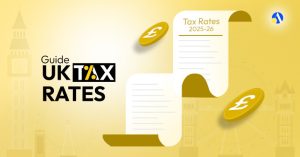If you’re running a limited company, you’ve probably come across the term “share capital.” But what is share capital, and why is it so important? From securing funding to meeting your legal obligations, understanding share capital is key to managing your company’s finances. So, what do you need to know?
This guide will explain the share capital meaning, explore its advantages and disadvantages, and walk you through how to manage it effectively. By the end, you'll have a clear picture of how share capital works and how it impacts your business.
What is Share Capital?
Share capital, also known as equity capital or paid-in capital, is the money a company raises by issuing shares to investors. When shareholders buy shares, they are essentially purchasing a portion of ownership in the company. The funds from this sale are then used to finance business operations—from hiring staff and buying equipment to launching new products.
On a company's balance sheet, you’ll find share capital listed under the 'shareholders' equity' section. But what does this number actually represent?
Share capital only reflects the nominal value (also known as par value) of the shares issued. Think of the nominal value as the minimum price a share can be sold for when it's first created. Any money paid by an investor above this initial value is recorded separately, often as 'additional paid-in capital' or 'share premium'.
Let's imagine you and a friend decide to start a coffee shop as a limited company. You issue 100 shares with a nominal value of £1 each. This means your initial share capital is £100 (100 shares x £1).
A few months later, an investor loves your coffee and wants to buy into the business. They purchase 50 new shares, but because the business is now more valuable, they pay £20 for each share. Here’s how that looks:
- The share capital increases by £50 (50 shares x £1 nominal value).
- The extra £950 (£19 per share x 50 shares) is recorded as additional paid-in capital.
This distinction is important because it separates the company's core capital from the premium investors were willing to pay.
The Advantages of Share Capital
When it comes to funding your business, why might raising money through shares be better than taking out a loan? It turns out, there are some pretty compelling reasons!
- No Interest Payments: Free Money (Kind Of)!
Unlike a bank loan that demands regular interest payments, the money you get from selling shares doesn't come with that burden. Imagine the freedom! This means more financial breathing room for your business, letting you focus on growth rather than debt. Isn't that a relief? - Boost Your Business's Reputation:
Think of a healthy share capital as a badge of honour. When investors, lenders, and partners see that your company has a solid financial foundation (a good amount of paid-up share capital), it tells them you're serious and stable. It builds trust and can even attract more investment down the line. Who wouldn't want that kind of credibility? - Ultimate Flexibility: Use Funds How You Need Them:
One of the biggest perks? Money raised through shares isn't tied down by the strict rules often found in loan agreements. Need to pour resources into groundbreaking research? Expand into new markets? Or simply cover daily operational costs? Equity financing gives you the power to direct capital exactly where it's needed most. How empowering is that for your business strategy?
The Disadvantages of Share Capital
While share capital offers many advantages, it's crucial to understand the potential downsides before you dive in. These are some key drawbacks to consider:
- Dilution of Ownership and Control:
Ever thought about what happens when you sell a piece of your company? When you issue new shares, you're literally doing that. This means the ownership stake of current shareholders – including you, the founder – gets a bit smaller. As more shares enter the market, each individual share has less voting power. This can impact your decision-making and overall control. How comfortable are you sharing that control? - Reduced Dividends Per Share:
Imagine a fixed pie. If you cut that pie into more slices, each slice gets smaller, right? It's the same with dividends. If your company pays out a set amount in total dividends, issuing more shares means each share receives a smaller payout. This can certainly be a point of contention for existing investors, as their potential returns might feel diminished. Is this a risk you're willing to take with your investors? - Vulnerability to Takeovers:
Could issuing a lot of new shares make your company an easier target? Potentially, yes. If a competitor or another entity acquires a majority of your company's shares through new issuances, they could gain significant control, even leading to a takeover. Are you prepared for this possibility?
Share Capital: A Quick Comparison
To help you weigh the options, here’s a straightforward comparison of the pros and cons:
| Advantages | Disadvantages |
| No interest payments or regular debt repayments. | Dilutes the ownership stake of existing shareholders. |
| Enhances the company's financial credibility. | Reduces the founders' and early investors' control. |
| Provides financial flexibility for business growth. | Can lead to smaller dividend payouts per share. |
| Attracts long-term investors. | May make the company vulnerable to takeovers. |
Key Questions About Share Capital Answered
Navigating the world of share capital can bring up many questions. Here are clear, straightforward answers to some of the most common ones.
How much should I value each share in my company at?
The "nominal value" of each share? That's really up to you! Many new companies keep it simple, setting it at something like £1 or even £0.01 per share. This value is important because it represents the minimum amount a shareholder is legally liable for their shares if the company ever gets wound up.
While you can choose any nominal value, why do most businesses keep it low? It's often just more practical. Remember, this nominal value is quite different from the actual market value or sale price of your shares. That's the price investors are willing to pay, and it can be much higher, constantly changing based on how well your company is doing and its overall valuation.
What are share classes?
Share classes allow a company to create different types of shares with different rights. For example, you might have:
- Ordinary Shares: These are the most common type and typically come with voting rights and the right to receive dividends.
- Preference Shares: These shares usually carry a right to a fixed-rate dividend before ordinary shareholders are paid. They may or may not have voting rights.
- Non-Voting Shares: As the name suggests, these shares do not give the holder any voting power in company decisions.
Using different share classes can help founders retain control while still raising capital from investors.
How do I increase share capital?
If you’re looking to boost your company’s share capital, you’ll need to issue new shares—this is called ‘allotment.’ The first step? Get the green light from your existing shareholders, usually by passing a special resolution to approve the creation of new shares.
Once that’s sorted, don’t forget the admin side—within a month of allotting the new shares, you need to file a Form SH01 (Return of allotment of shares) with Companies House to let them know about the changes. It’s a crucial step, so mark your calendar!
How do I reduce share capital?
Reducing share capital is more complex and has strict legal procedures. A company might do this to return surplus capital to shareholders or to eliminate historical losses. The process generally requires a special resolution from shareholders supported by a solvency statement from the directors.
Within 15 days of passing the resolution, you must file a Form SH19 (Statement of capital for a reduction of capital) with Companies House, along with a copy of the resolution and the directors' statements.
Simplify Your Company Finances with Debitam
Managing share capital is just one piece of your company's financial puzzle. Beyond this, the continuous administrative burden—from annual accounts to payroll and VAT returns—can be immense. Did you know that studies suggest small business owners in the UK can spend up to 10 hours a week on financial administration alone? That's valuable time taken away from strategic growth.
At Debitam, we understand this challenge. Our mission is to simplify accounting and tax filing for limited companies, startups, and self-employed professionals across the UK. How do we achieve this? Our online platform empowers you to manage your financial compliance duties efficiently, providing expert support every step of the way. We ensure your iXBRL accounts and tax returns are accurately prepared and filed with Companies House and HMRC, all on time.
Imagine reclaiming those hours and focusing purely on developing your business. Are you ready to navigate company finances with confidence and clarity? Let Debitam handle the complexities of compliance, so you can dedicate your energy to what you do best: growing your business.













